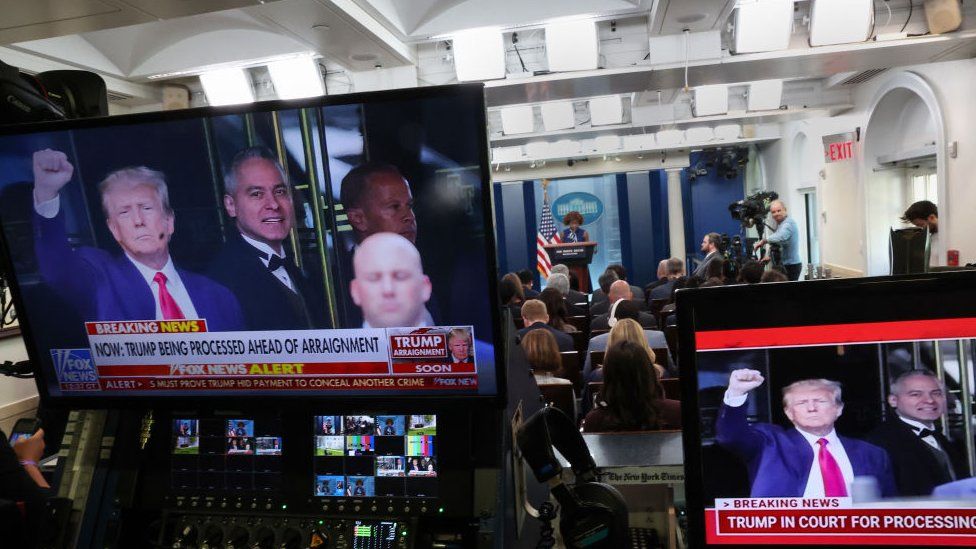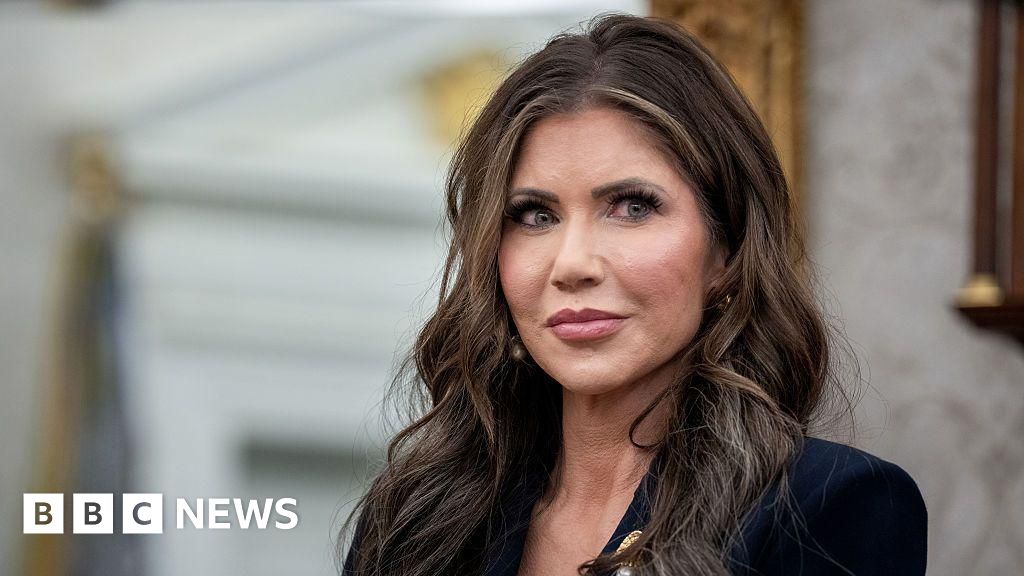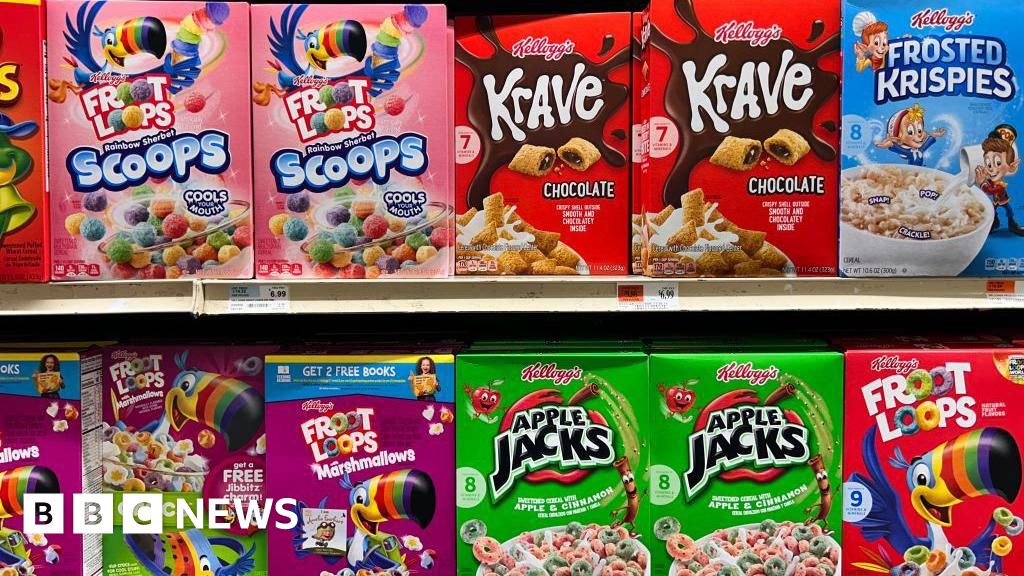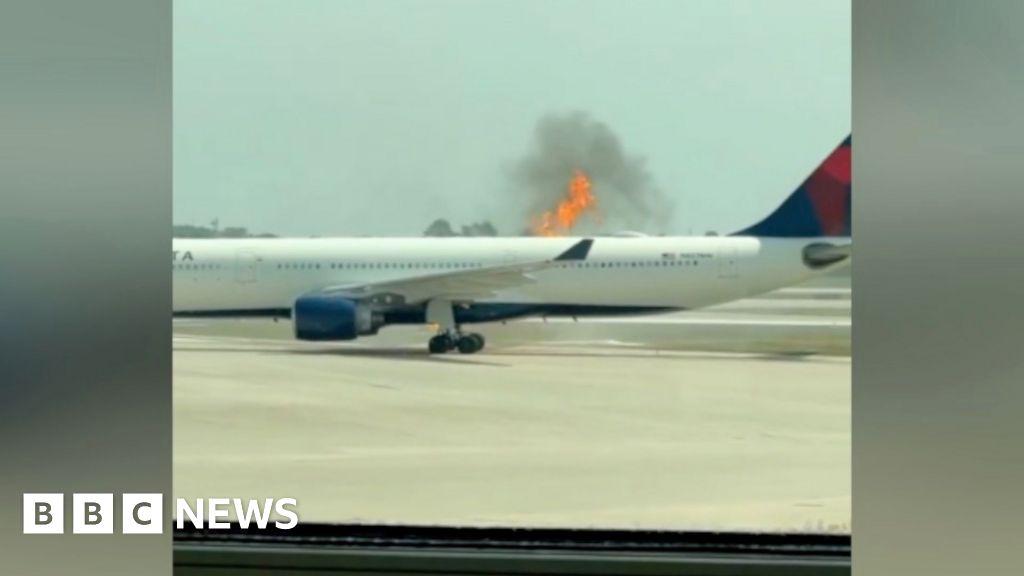ARTICLE AD BOX
 Image source, Getty Images
Image source, Getty Images
The former president's legal troubles were on reporters' minds at the White House press briefing
By Katty Kay
US Special Correspondent
"Down in Mar-a-Lago, they're calling it total dominance," the Trump associate chuckled as he slid his phone across the desk to show me a photo.
The image was of a dozen different TV channels all tuned to Trump's speech hours after the former president's historic arrest. It was taken by one of Trump's aides who was with him down in Florida and then sent around as bragging rights to show how much coverage Trump can still command.
"They just give us free airtime," the associate added, almost perplexed. If American election campaigns are a war, TV is the battlefield and this week team Trump blew all his opponents off the map.
Hours of breathless coverage of his plane taking off from Florida, landing in New York, sitting on the runway in New York, still sitting on runway in New York, suggested the media is still hungry for all things Donald Trump. Even when that's just baggage handlers unloading cargo from a stationary plane. And all the while Mr Trump himself was sitting on his plane, watching the TV stations watch him.
I am not suggesting there was no news merit in covering the first ever indictment and arraignment on felony charges of a former President of the United States. It was a watershed moment in American politics that could have short term implications for Mr Trump's bid to win the White House a second time - and longer term implications for a country that may now see arresting former presidents as par for the course.
The arrest was a big deal and it will change American politics. But hours of coverage of an uneventful journey from Palm Beach to Manhattan gave Mr Trump a lot of TV time that he didn't have to pay for out of campaign funds.
Back in 2016 the US press was criticised for covering the ever colourful Mr Trump more extensively than his Republican rivals for the presidential nomination. He would famously call into cable news TV shows on his cell phone and get 20 minutes of airtime (full disclosure, I took part in some of those interviews. He once told me I was too negative about his campaign, but added that I shouldn't worry about it.)
Image source, Reuters
Image caption,Hundreds of journalists were on hand for Trump's arraignment in Manhattan.
Afterwards there was some hand wringing among Democrats who accused the media of helping Mr Trump win the White House just by covering him so much - which is ironic since the American media is often accused of skewing left. But at least when Mr Trump called into TV shows he was talking and saying something and being interviewed by reporters who had often tough questions and he got a lot of push back. This week he got airtime by just sitting on the tarmac. Total dominance. This is not 2016, and most newsrooms have thought hard about their Trump coverage. On Tuesday night several TV stations, including the BBC, dipped out of Trump's speech after a couple of minutes in order not to relay what was effectively a campaign rally. MSNBC didn't run the speech at all. But nearly all stations were glued to his flight up to New York the day before his court appearance - I even saw a tweet that an Italian TV channel was running it live. And of course the reason is clear. Trump still makes news and boosts ratings in a way that no other US political candidate ever has. Which is a problem for anyone running against him.
Did you know that Florida Governor Ron DeSantis was in the swing state of Michigan this week, talking to a packed convention hall of Republican voters? Or that Nikki Haley, one of only three Republicans actually officially running for the presidency, announced this week that she's raised $11 million in campaign funds?
Maybe you missed that news because you were glued instead to President Joe Biden's speech in Minnesota, touting the benefits of his administration's manufacturing policy. No? Don't feel bad, we're all in the same Trump-powered boat. It is too soon to say whether this week's arrest is good news for Donald Trump's candidacy or not. But it did teach us one thing for sure - Mr Trump still dominates headlines. Which means the other Republican candidates, as well as the current president himself, will have to find a way to get media coverage of their own. And the American TV networks will have to decide what is newsworthy in the Trump campaign, and what isn't.
Watch: Trump claims his indictment is election interference in post-court speech

 2 years ago
32
2 years ago
32








 English (US) ·
English (US) ·